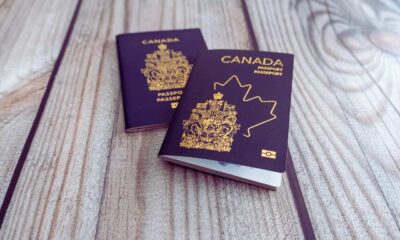Guest Blog
Unlocking Opportunities: Why Study in Canada

Canada stands as a beacon of academic excellence and cultural diversity, making it one of the most sought-after destinations for international students worldwide. Offering a perfect blend of quality education, vibrant multiculturalism, and an exceptional quality of life, Canada has firmly established itself as one of the best places to pursue higher education. Here, we exclusively highlight a few reasons why one should study in Canada.
Academic Excellence in Canada
When considering higher education, the reputation of the universities is paramount. Canada boasts several world-renowned institutions that consistently rank high in global academic standings. Among the top-ranking universities are the University of Toronto, McGill University, and the University of British Columbia.
Affordable Education
Canadian universities are celebrated for their commitment to providing students with practical experience and research opportunities.
Canada offers international students the advantage of affordable education. While tuition fees may vary depending on the institution and the specific program, Canada consistently offers lower tuition costs compared to other English-speaking nations.
Diverse Academic Disciplines
Whether you’re interested in technology, engineering, natural sciences, business, or the humanities, Canadian universities have something to offer. Canada’s tradition of excellence extends to various academic disciplines, and it’s renowned for its interdisciplinary approach to education. In addition to traditional fields, Canadian institutions excel in unique programs such as Indigenous studies and environmental science.
Multicultural Society
Canada is celebrated for its diversity and inclusivity. Canada promotes a multicultural society and welcomes people from all walks of life. It is known as a melting pot that creates a dynamic and inclusive learning environment for international students.
Vibrant Cities
Those who are looking to study in Canada must also know that Canada has a vibrant nightlife, and offers exciting urban hubs like Toronto, Vancouver, and Montreal. These cities are home to some of the country’s top universities.
Canadian Culture: A Unique Blend
Canada’s culture is characterized by friendly people, a welcoming attitude toward foreigners, and a unique blend of influences from its southern neighbor, the United States. Canadians are known for their politeness.
Official Languages: English and French
If you’re planning to study in Canada, then you need to learn either of the official languages of the country English or French. This linguistic diversity offers international students the option to study in their language of preference, making it even more accessible to a global audience.
Culinary Delights
Canadian food culture is diverse, with traditional dishes reflecting the country’s rich culinary heritage. While studying in Canada, you must try iconic Canadian dishes like Poutine (French fries with cheese and gravy) and Saskatoon berry pie (a sweet crusty pie with blueberry filling).
Varied Climate
Canada’s vast size means it experiences a wide range of climate conditions. The country enjoys all four seasons, with mild weather on the Pacific coast and more extreme weather, including hot summers and harsh winters, in the Prairie provinces.
Choosing a University in Canada
Canada has over 200 public and private universities. Must follow the below steps while choosing a university in Canada:
- Check for Agreements: Some countries have agreements with Canada that simplify the application process, visa requirements, and tuition fees for students from those countries.
- Explore University Rankings: Research university rankings, keeping in mind that high-quality universities can be found beyond the top 100.
- Consider Geography: Canada’s vast size means there are large distances between cities and universities. Consider whether this aligns with your preferences for travel and commuting.
- Match Strengths to Admission Criteria: Review the admission requirements of multiple universities and identify where you may have a competitive edge.
- Estimate Expenses: Different Canadian cities and universities have varying tuition fees and living costs. Determine your budget and choose accordingly.
- Career Prospects: Consider the university’s connections to your chosen industry and how it may benefit your future career.
- Campus Size: Decide whether you prefer a bustling urban campus or a quieter, smaller community.
Choosing the right university to study in Canada is a crucial decision, so invest time in thorough research before applying. If you’re confused and don’t know where to begin then let the experts help you. ImmigCanada is a Canadian immigration consultancy that is seasoned in helping applicants with the right pathway to Canada.
Top Universities in Canada
Canada boasts several world-class universities known for their research, innovation, and academic rigor. Here are the top five universities in Canada:
- University of Toronto: A top research-intensive institution known for education, research, and knowledge development.
- University of British Columbia (UBC): An internationally acclaimed public university consistently ranked among the top 20 worldwide.
- McGill University: Known for its diverse international student community, research institutes, and rich history.
- McMaster University: Located in the vibrant city of Hamilton, it’s famous for its innovation in learning and discovery.
- University of Montreal: A cosmopolitan university set amidst natural beauty and modern architecture.
Top Student Hubs in Canada
Canada’s top student hubs offer an enriching academic and cultural experience. Here are four prominent student cities in Canada:
Toronto: Canada’s largest city, home to the University of Toronto, Ryerson University, and York University. Known for its diverse culture and bustling city life.
Vancouver: Located on the west coast, known for its stunning natural beauty and home to the University of British Columbia, Simon Fraser University, and Emily Carr University of Art and Design.
Montreal: A bilingual city where both French and English are commonly spoken. It houses institutions like McGill University, Concordia University, and Université de Montréal, known for vibrant arts and culture scenes.
Ottawa: Canada’s capital city, hosting the University of Ottawa and Carleton University. Ideal for students interested in politics or government.
Tuition Fees in Canada
Tuition fees are a big worry for people who are looking to study in Canada. The fees vary based on the province, program type, and whether you’re an international or domestic student. On average, international students pursuing a Bachelor’s degree can expect to pay around 36,000 CAD annually. However, fees for certain courses like medicine, and dentistry may exceed 50,000 CAD per year.
Scholarship Opportunities
Canada offers various scholarships for international students based on merit, need, and specific criteria. Following are the prominent scholarships:
- Vanier Canada Graduate Scholarships: These scholarships are for doctoral students, providing up to 50,000 CAD per year for three years.
- University-specific Scholarships: Many Canadian universities offer scholarships to international students. Check the individual university websites for details.
- Government Scholarships: Some provinces offer scholarships specifically for international students, such as the Ontario Trillium Scholarships.
- External Scholarships: Organizations and foundations, both within Canada and internationally, offer scholarships to international students.
- Research Assistantships: Many graduate students receive financial support through research assistantships, covering tuition and providing a stipend.
It’s important to research and apply for scholarships well in advance, as application deadlines and eligibility criteria may vary.
Work Opportunities
Canada provides international students with excellent opportunities to gain work experience during and after their studies. Here are some essential points to note:
Work While Studying
International students with a valid study permit can work part-time (up to 20 hours per week).
Post-Graduation Work Permit (PGWP)
After completing a program of study in Canada, graduates can apply for a PGWP, which permits them to work in Canada for up to three years.
Quality of Life
Canada consistently ranks high in quality of life indices, thanks to its strong healthcare system, low crime rates, and overall safety. Canadian cities are renowned for their clean, green spaces, excellent public transportation, and well-developed infrastructure.
Visa and Immigration
To study in Canada, you’ll need a study permit (student visa). The application process may vary based on your home country, but it typically involves the following steps:
- Acceptance to a Designated Learning Institution (DLI): You must first be accepted into a Canadian institution before applying for a study permit.
- Study Permit Application: Apply for a study permit through the Immigration, Refugees, and Citizenship Canada (IRCC) website or your local Canadian embassy or consulate.
- Biometrics and Interview: Depending on your country of residence, you may need to provide biometrics and attend an interview at a Visa Application Center (VAC).
- Medical Examination: In some cases, you may need to undergo a medical examination.
- Funds Proof: You’ll need to demonstrate that you have sufficient funds to cover tuition fees, living expenses, and return transportation.
- Travel Documents: Ensure your passport is valid throughout your intended stay in Canada.
Studying in Canada offers a unique opportunity to experience world-class education, a diverse culture, and exceptional career prospects. With its welcoming society, affordable education, and vast landscape, Canada stands as a promising destination for international students seeking an enriching academic journey.

























